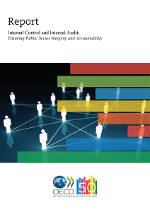Directorate for Public Governance
Internal Control
|
RISK MANAGEMENT Integrity risk management aids decision-making and ultimately helps to ensure the achievement of integrity objectives.
|
EXTERNAL AUDIT External audit functions, or Supreme Audit Institutions, hold governments accountable for how they spend public money, and provide insights and foresights about value-for-money and systemic risks. |
PUBLIC INTEGRITY Public integrity refers to the consistent alignment of, and adherence to, shared ethical values, principles and norms for upholding and prioritising the public interest over private interests in the public sector. |
For more information, contact the Public Sector Integrity Divison: GOVintegrity@oecd.org
Related Documents
- Public Sector Internal Control, Risk Management and Audit
